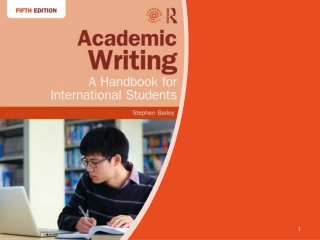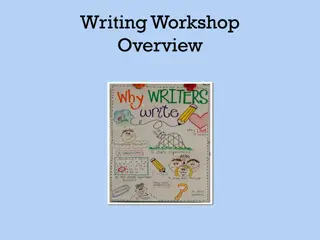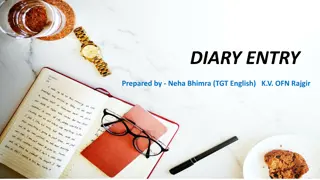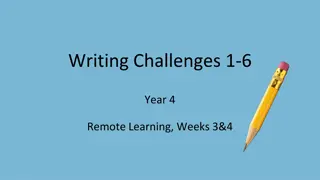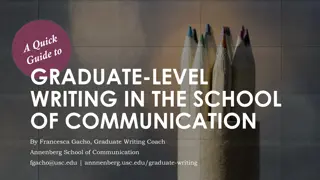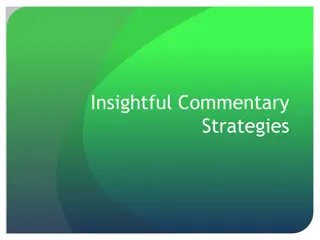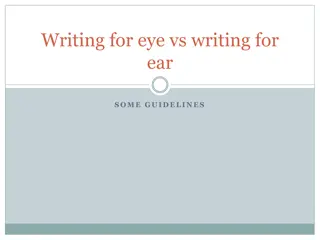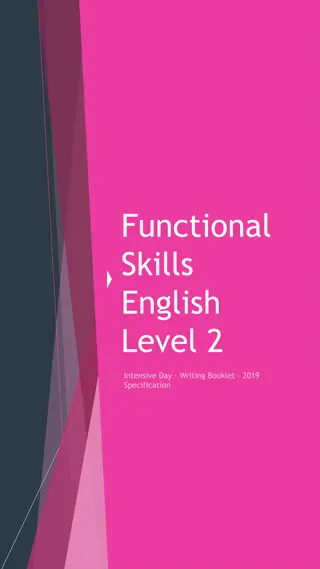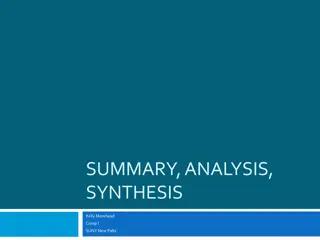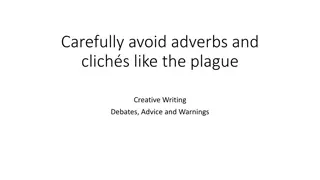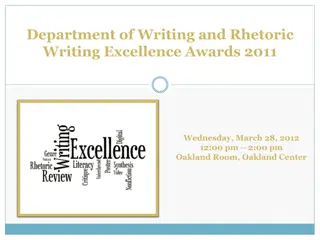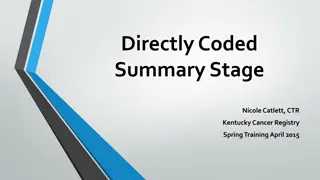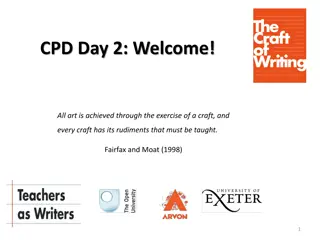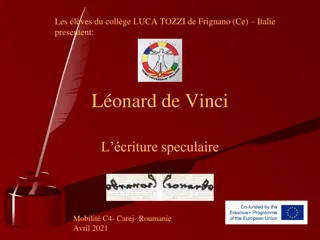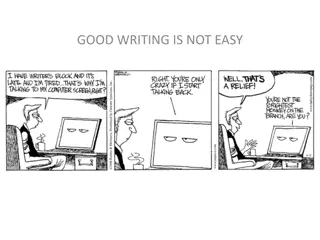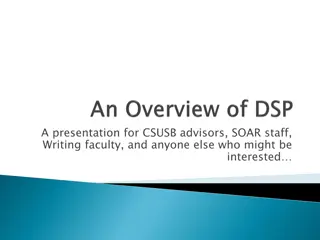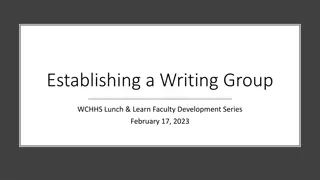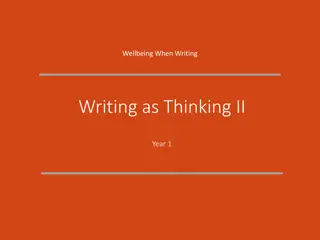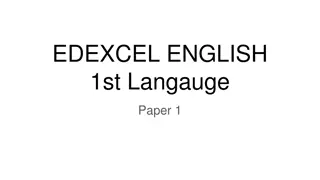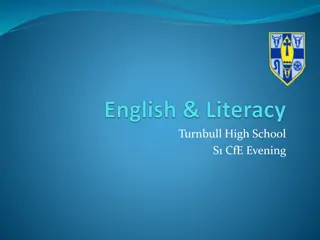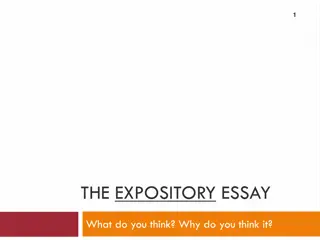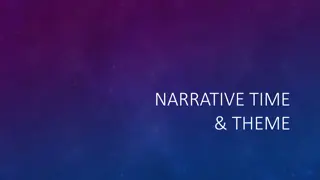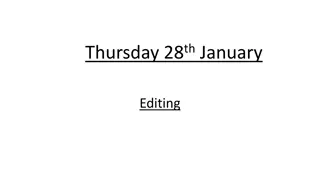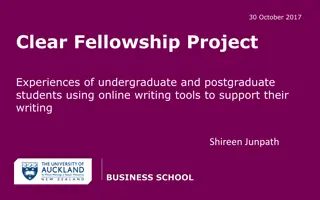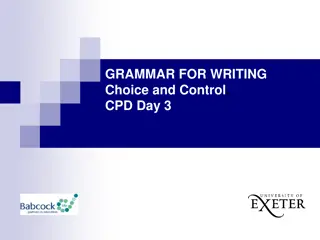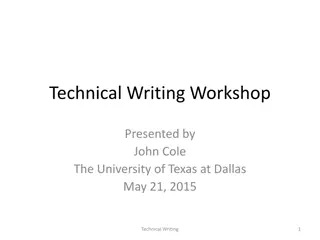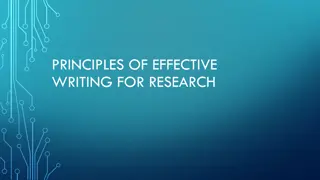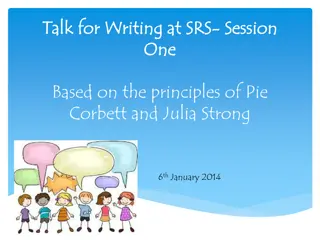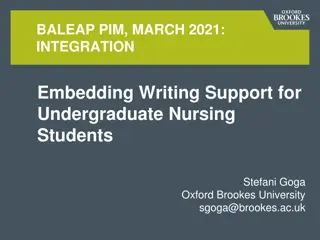Understanding the Academic Writing Process
Explore the stages involved in academic writing, from analyzing the title to proofreading the final draft. Learn about the basics of writing, types of academic writing, common reasons for writing, and text components like paragraphs and citations.
1 views • 42 slides
Exploring Citizen Journalism and Non-Fiction Writing
Explore the world of citizen journalism and non-fiction writing, learning about text types, adapting writing to conventions, considering audience, purpose, and tone. Discover the significance and usefulness of non-fiction writing, and delve into creating various text types. Uncover the role of citiz
1 views • 11 slides
Comprehensive Overview of English Writing Course
This comprehensive English writing course, led by lecturer Muhammad Muslim Nasution, covers various aspects such as grammar, vocabulary, writing styles, and assessments. Students are required to actively participate, submit assignments, attend classes regularly, and produce writing projects. The cou
2 views • 8 slides
Comprehensive Guide to Writing Workshop Essentials
Explore the fundamental elements of a successful writing workshop, including connecting Common Core standards with writing practices, emphasizing the writing process over the final product, establishing a conducive room environment, and providing essential materials for effective writing sessions.
1 views • 18 slides
Guide to Diary Writing: Tips and Examples
Diary writing is a personal form of expression loved by both young and old. The quality of diary writing depends on creativity and imagination. A good diary entry should include day, date, time, a descriptive heading, and be written in first person. Writing informally and experientially adds authent
2 views • 9 slides
Mastering Academic Writing: Strategies for Success
Academic writing is a formal style of writing with specific characteristics such as accuracy, brevity, and clarity. Understanding academic style is crucial for success in your course as it reflects your engagement with the content. Successful academic writers read, learn new vocabulary, and have a s
0 views • 23 slides
Challenges and Perspectives in Academic Writing for English Learners: Insights from Yemeni Students and Educators
Exploring the challenges and experiences of MA English students in academic writing, the narrative reveals issues faced by learners in Yemen such as outdated curricula, lack of teaching aids, and struggles with writing skills. Insights from a teacher highlight improvements in syllabi yet continued c
0 views • 14 slides
Academic Writing Essentials: Background, Types, and Formats
Explore the essential aspects of academic writing in this comprehensive guide. Learn about the purpose of academic writing, common types such as projects and essays, and the formats for short and long writing tasks. Discover the features of academic writing like accuracy, objectivity, and formal sty
6 views • 46 slides
Year 4 Writing Challenges for Remote Learning - Weeks 3 & 4
Engage in a series of creative writing tasks focusing on creating an imaginative character, using imaginative vocabulary, writing a personal letter, using persuasive language, and writing a newspaper report inspired by Chapter 1 to 6 of "The Iron Man." Explore various writing skills while immersing
1 views • 7 slides
Understanding Graduate-Level Writing in Academic Communication
Explore the nuances of academic writing at the graduate level in the School of Communication with Francesca Gacho, a Graduate Writing Coach. Learn about the features, characteristics, and strategies necessary for various genres of writing in this context. Discover the expectations and conventions of
2 views • 30 slides
Mastering the Art of Insightful Commentary
Understanding the differences between summary and commentary, exploring the multifaceted nature of commentary, and following key rules enhance your ability to provide deep, original insights in your writing. Avoid subjective phrases, maintain a 2:1 ratio of commentary to summary, and follow prompts
0 views • 6 slides
Writing for the Ear vs. Writing for the Eye - Guidelines
Writing for the ear requires a different approach than writing for the eye. It involves focusing on clarity, brevity, and accuracy, as listeners do not have the luxury of re-reading. This method is crucial for speeches, radio scripts, and commercials to ensure effective communication. The importance
1 views • 17 slides
Mastering Functional Skills English Level 2: Writing Section Guide
Functional Skills English Level 2 focuses on reading and writing exams, along with a speaking and listening component. This course enhances your comprehension and writing abilities, teaching you to extract meaning from texts and craft your own writings using various techniques. The writing section i
1 views • 32 slides
Understanding Summary, Analysis, and Synthesis in Academic Writing
Summary, analysis, and synthesis are essential components of academic writing. Summary involves restating information while analysis breaks down parts to understand the whole. Synthesis brings together ideas from different sources to create new insights. Each serves a unique purpose in creating well
0 views • 8 slides
Creative Writing Debate: Worthwhile or Worthless?
Delve into the ongoing debate on the value of creative writing courses, as discussed by renowned authors such as Hanif Kureishi, Will Self, and Fay Weldon. While Kureishi criticizes such courses as a waste of time due to perceived lack of talent, Self emphasizes the importance of unique self-learnin
0 views • 25 slides
Creative Teaching Approaches for Persuasive Writing Workshop
The workshop focuses on using Grammar for Writing principles to enhance teaching of persuasive writing, emphasizing modal verbs and adverbials. It encourages creative writing by engaging young writers' imaginations and beliefs, allowing freedom to explore ideas. Participants learn key teaching princ
0 views • 51 slides
Department of Writing and Rhetoric Writing Excellence Awards 2011
The Department of Writing and Rhetoric at Oakland University organized the Writing Excellence Awards in 2011, recognizing outstanding submissions across various categories including writing from/about sources, original research, visual and/or auditory composition, fiction, and creative nonfiction. T
1 views • 42 slides
Understanding Summary Staging in Cancer Cases
Staging cancer cases is a critical process to determine the extent of the disease at diagnosis. Summary staging, including SEER Summary Stage 2000, categorizes cancer spread, combining clinical and pathologic data. Learn about primary staging systems, summary staging groups, and how cancer spreads l
0 views • 41 slides
Comprehensive Guide to Kindergarten Writing Training for NYSESLAT 2019
Explore a detailed guide on Kindergarten Writing Training for the NYSESLAT 2019 exam. The training covers four constructed-response types including Letter Writing, Word Writing, Sentence Writing, and Writing a Story. Gain insights into the application of holistic writing rubrics, analyzing student r
0 views • 24 slides
Craft of Writing Framework for Teaching Writing
Explore the Craft of Writing Framework to enhance your teaching of writing skills, transforming your Arvon residential experiences into effective classroom strategies. Embrace language choices, text-level decisions, authorship, writing processes, and reader-writer relationships to empower students i
0 views • 39 slides
Enhancing Postgraduate Academic Writing: Feedback Collaboration Model
Developing a collaborative model for postgraduate academic writing courses involves understanding the role of feedback, focusing on content feedback, and exploring the intersections between discipline specialist and writing tutor feedback to improve academic writing abilities. Feedback offers valuab
1 views • 27 slides
Leonardo da Vinci and His Mirror Writing
The students of Luca Tozzi College in Frignano, Italy, explore Leonardo da Vinci's specular writing, a unique form of left-handed writing that can only be deciphered using a mirror. Discover Leonardo's diverse talents as a painter, inventor, scientist, and writer, with a mysterious side to him as a
0 views • 14 slides
Mastering the Art of Good Writing
Crafting compelling writing requires attention to detail, from intriguing leads to precise word choices and smooth transitions. Explore the essential elements of good writing, including tips for engaging readers and a checklist for evaluating writing quality. Learn about different types of leads in
0 views • 42 slides
Evolving Writing Placement Processes in Higher Education
In the presentation for CSUSB advisors, SOAR staff, and Writing faculty, the transition from traditional placement exams to self-placement models for first-year writing courses at CSUSB is highlighted. The shift aims to empower students to assess their own literacy practices, contrasting high-stakes
0 views • 24 slides
Establishing a Writing Group for Faculty Development in WCHHS Lunch & Learn Series
Engage in a dynamic writing group to foster collaboration, receive feedback, and enhance productivity. Explore the benefits of accountability, safe feedback, and breaking down frustrations while celebrating accomplishments. Dive into logistics, including duration variability, writing retreat options
0 views • 9 slides
Enhancing Wellbeing Through Writing: Writing as Thinking
Explore the connection between writing and thinking as a vital tool for academic writing. Delve into strategies for effective writing, evaluating its impact on rigorous thinking, and overcoming challenges through reflective writing exercises.
0 views • 34 slides
Enhancing Writing Skills at Escrick C of E Primary School
At Escrick C of E Primary School, the approach to English education focuses on core skills like phonics, reading, writing, and letter formation. The curriculum incorporates a variety of text types and genres, including persuasive writing, biographies, fiction, and poetry. Writing activities are embe
0 views • 10 slides
Edexcel IGCSE First Language English Paper 1 Overview
Paper 1 of Edexcel's IGCSE First Language English assesses reading and writing skills. The examination consists of a reading section and a writing section. In the reading section, students engage with various texts and answer comprehension questions. The writing section offers different tasks like n
0 views • 16 slides
Enhancing Writing Skills: Strategies and Techniques
The focus is on raising attainment in writing among students at Turnbull High School. The school aims to help students improve the quality and sophistication of their writing by building upon prior knowledge and introducing new skills. Strategies like VCOP and A.CARP.PIE are used to teach students h
0 views • 14 slides
Writing in Computer Science Research: Enhancing Technical Writing Skills
This course overview covers the main objectives, class structure, and learning outcomes of a Computer Science Research Writing course focused on developing students' writing abilities, providing constructive criticism, and applying technical writing concepts to research papers in a workshop format.
0 views • 46 slides
The Power of Expository Writing: Importance and Impact
Expository writing is essential for clear communication and expressing thoughts effectively through written words. This form of writing helps convey ideas, information, and opinions concisely, making it crucial for academic, professional, and personal communication. The structure of expository writi
0 views • 30 slides
Exploring Narrative Techniques for Representing Time in Writing
Explore the fundamental methods of narrating time in writing, including scene, summary, sequential summary, circumstantial summary, flashbacks, and non-linear narrative structures. Learn how writers transition between summary and scene, manipulate time, and craft engaging story arcs. Delve into exam
0 views • 9 slides
Spring into Writing: Enhancing Writing Skills for Children
Join us for an evening dedicated to enhancing writing skills for children according to Maryland College and Career-Ready Standards. Learn about writing expectations, get motivated writing ideas for children, and explore fun writing opportunities at home. The event will provide insights into differen
1 views • 19 slides
Learning to Edit and Improve Writing Skills
Today's lesson focuses on editing and correcting mistakes in writing, emphasizing the importance of identifying errors in spelling, punctuation, and grammar. Students are encouraged to review their own work, make necessary edits, and enhance their writing by using synonyms and improving word choice.
0 views • 6 slides
Exploring the Impact of Online Writing Tools on Student Writing Experiences
This project by Shireen Junpath delves into the experiences of undergraduate and postgraduate students using online writing tools to enhance their writing skills. The study aims to understand the effectiveness of tools like Grammarly, Lextutor, and Academic Phrasebank from the perspectives of studen
0 views • 27 slides
Creative Teaching Approaches in Grammar and Writing Intervention
Re-iterating teaching principles for writing intervention, focusing on grammatical subject knowledge, adverbials, modal verbs, and passive voice. Emphasizing creative teaching methods for persuasive writing, fostering imagination, emotions, and personal beliefs in young writers. Incorporating space
0 views • 60 slides
Comprehensive Technical Writing Workshop by John Cole at The University of Texas at Dallas
Explore the world of technical writing with John Cole, an experienced instructor at The University of Texas at Dallas. This workshop covers the fundamentals of technical writing, including course objectives, programming, course outline, traits of technical writing, and what technical writing truly e
0 views • 58 slides
Writing Research Papers Effectively: Guidelines and Steps
Effective writing for research involves developing a good research idea, writing a literature review, and understanding the key elements of writing research articles. This process includes coming up with a strong research question, gathering relevant information, creating an outline, writing the dra
0 views • 26 slides
Enhancing Writing Skills Through Talk for Writing Approach
Discover the key principles of Talk for Writing, understand the importance of Shared Writing, and explore how to improve the teaching and learning of writing in your classroom. Learn about the challenges children face in writing compared to reading and how Talk for Writing can help externalize the i
0 views • 27 slides
Integrating Writing Support for Nursing Students: A Genre-Based Approach
Designing writing support for undergraduate nursing students involves understanding the cohort's unique needs, such as time constraints and diverse learning backgrounds. Using a genre-based approach, which focuses on analyzing specific student genres, can enhance instructional materials and improve
0 views • 17 slides
